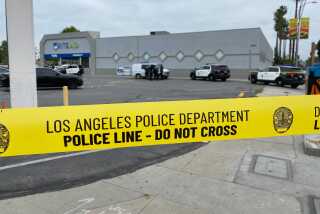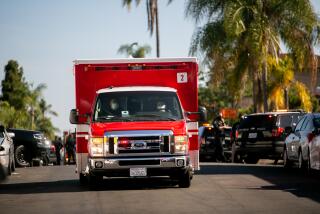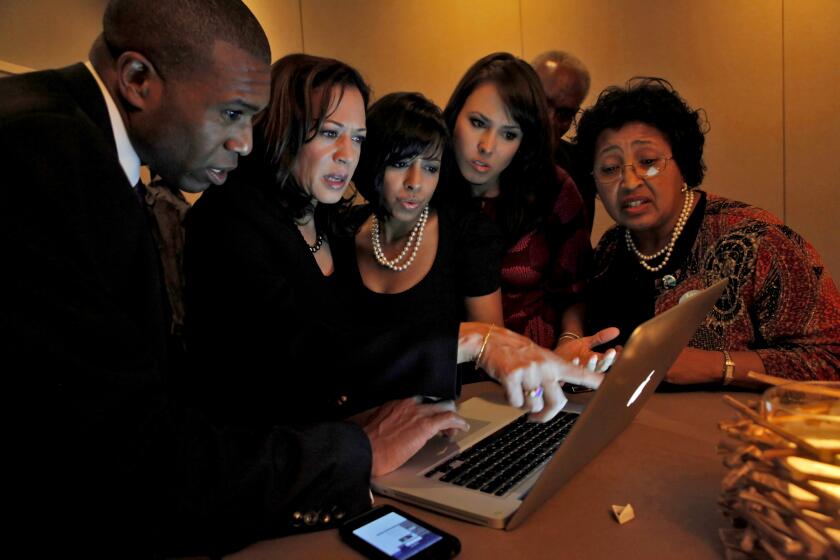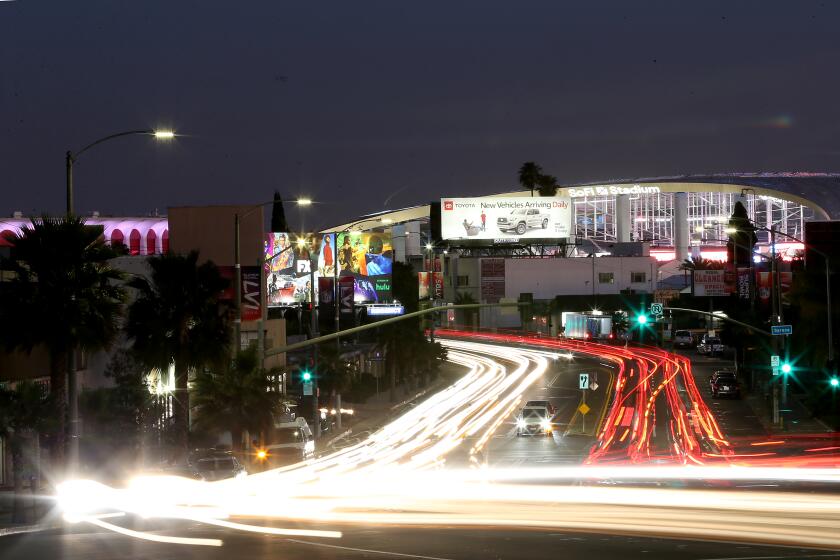Op-Ed: When 911 is the wrong number
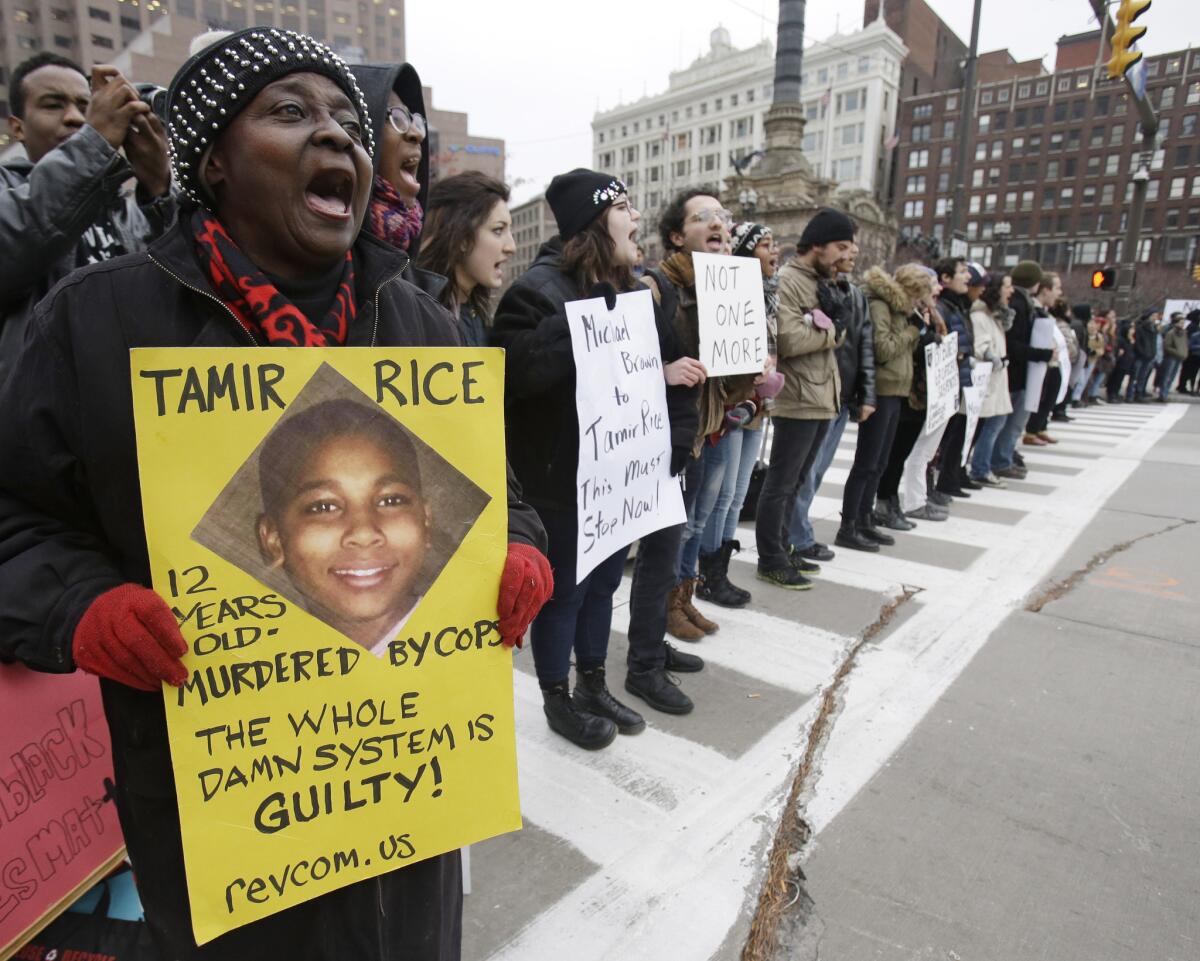
Demonstrators gather in Cleveland on Nov. 25, 2014, during a protest over the police shooting of 12-year-old Tamir Rice.
On a clear night last winter, a man in Venice Beach broke the quiet of the wee hours by standing in the middle of the street in front of my house and shouting violent threats. “I’m going to kill you,” he shrieked, adding an expletive and a disparaging term for women. I rushed to the window to see what was happening. Thankfully, he wasn’t shouting at anyone in particular. He appeared to be mentally ill, and his words were directed at parked cars, buildings and the sky.
He wasn’t waving a gun or a knife, but he didn’t move along; he just stood there shouting every threat imaginable. Would he hurt himself? Would he attack a pedestrian if one happened by? Or would he do no more harm than waking up the neighbors?
Years ago, I’d have dialed 911 “just to be safe.”
But on that night, I witnessed a disturbance of the peace by a (presumably) homeless man and decided that, “just to be safe,” I would not call the police. On too many occasions in my capacity as a journalist, I’d seen videos or read accounts of mentally ill people who were beaten or killed in encounters with law enforcement officers.
In the classic scenario, a mentally ill person is given an order and fails to react. Many cops know how to de-escalate a situation like that. But others see any failure to comply as a justification to use force. I didn’t want to risk summoning the latter sort of officer.
Across the country, protesters have been calling attention to instances of excessive force by the police, especially when their actions result in the death of young black men. In May, an LAPD officer killed Brendon Glenn, an unarmed homeless man, a few minutes from my house. In November, a 911 call alerted police that someone in a public park in Cleveland, “probably a juvenile,” had a gun that was “probably fake.” Tamir Rice, 12, was killed. His gun shot harmless plastic pellets.
In those cases and others, everyone would have been better off had the cops never shown up.
At the same time, there is a cost to public order and a risk to doing nothing when a kid in a park is waving a gun around or a homeless man is ranting in the street. Standing in my living room, I was thinking how guilty I’d feel if my call to the cops ended in the ranting man’s death, or if I did nothing and he wound up hurting a passing innocent. I wished there was someone to call other than the cops, someone trained to deal with the mentally ill.
As it turns out, something like this exists here: The L.A. County Department of Mental Health has a 24-hour phone line and what a spokesperson called “a variety of response teams, depending on the situation.” (In some cases a police officer and mental health worker could show up together.)
But few people know about that option; I didn’t until this week. Even among those who do, it’s easier to remember 911 in an emergency than 1-800-854-7771. And by virtue of the number of police officers, their cruisers are more likely to be close by. Beyond Los Angeles, jurisdictions vary in whether they offer any “alternative” first responders.
Alternative services should be more robust, and better publicized. Reducing police contact with the mentally ill is good for both groups.
Many of us were taught from childhood to seek assistance from police in any potentially dangerous situation. But sometimes a danger is small enough that the right civic decision is to refrain from summoning the cops, who do not deserve the presumption that they will comport themselves professionally. There are real-life heroes among our local police. But there are also bad apples and people who simply aren’t good at their jobs. Police officers are primed to expect danger, and they seldom face consequences when they use deadly force unnecessarily.
That’s why, when deciding whether to call mental health services, the police, or no one at all, I’ll continue to err on what I’ve come to believe is the side of caution: I’ll refrain, if possible, from dialing 911.
Conor Friedersdorf is a staff writer at the Atlantic and founding editor of the Best of Journalism email newsletter.
Follow the Opinion section on Twitter @latimesopinion and Facebook
More to Read
A cure for the common opinion
Get thought-provoking perspectives with our weekly newsletter.
You may occasionally receive promotional content from the Los Angeles Times.
